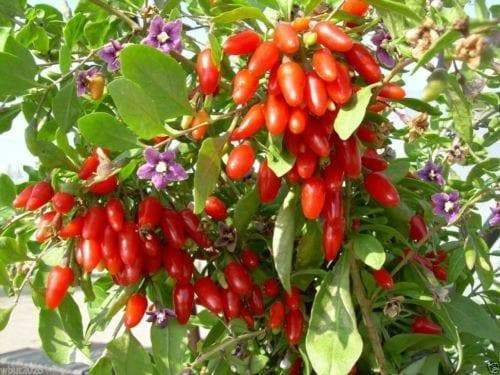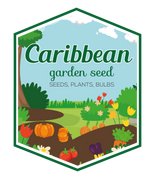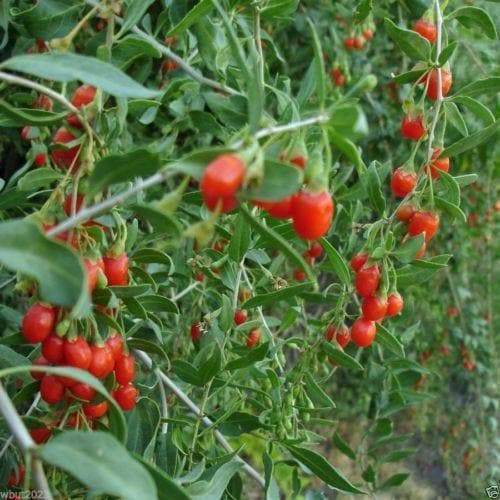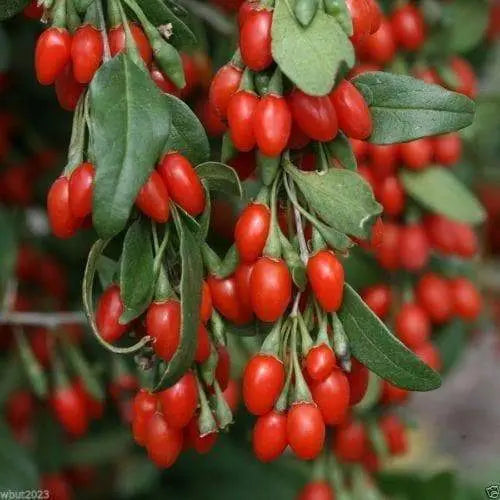
GOJIBERRY Live Plant,Gou-gi-zi,Matrimony vine,Lycium barbarum
Original price
$ 19.49
-
Original price
$ 48.99
Original price
$ 19.49
$ 19.49
-
$ 48.99
Current price
$ 19.49
Most orders are processed by the next day
Select your desired size and/or color from the available options.
Goji Berry Plant, produce year after year.Fruit this year ,Ship In 1 ft Bag
|
Super Food that's Super Easy! Goji Berries (a.k.a. Wolfberries) are used throughout the Orient to treat a broad range of ailments and diseases. They are high in antioxidants, amino acids, essential fatty acids and are widely used to reduce inflammation. Grow them yourself without the chemicals. Most Goji Berries come from China where they're often treated with chemicals that have been long banned in the US. They can turn an incredibly healthy food into something toxic.
This is one of the easiest plants to grow organically. It's highly disease resistant and rarely bothered by insects. Even deer and rabbits leave it alone. There is no need for any chemicals or sprays. Just plant it and pick. Don't baby your Gojis. They're naturally drought tolerant and like well draining soil. Thrives in zones 5-9, tolerating temps down to -18 F. Does well in the dry west or humid east. Likes containers or the ground. Goji will grow in sun or partial shade, but your harvest will be greater with more sun. Pick $175 worth of Berries each year from a single plant! A mature plant will produce almost 7 lbs of berries under good conditions. We don't know of any other fruit plant that has this incredible of a payback. Plus it continues to produce year after year. Eat Goji Berries all year long. Your berries get sweeter the longer you leave them on the bush and will be much tastier than what you buy in the store. Eat them fresh, juice them, freeze them or dry them on newspaper. Most people prefer to eat their berries like raisins. Grow several plants and enjoy healthy Goji Berries all throughout the year.
|
Lycium barbarum
Uses: Culinary/Medicinal Duration: Perennial (hardy in zones 3-9)
When to Sow: Spring/Late Summer/Early Fall Ease of Germination: Easy
Goji berries have had lots of media attention in recent years, and are thought to be a "superfood." They are certainly rich in nutrients, being packed with vitamins and minerals as well as amino acids and essential fatty acids. Five carotenoids are found in Goji berries: beta-carotene, zeaxanthin, lutein, lycopene, and cryptoxanthin. All of these are reputed to contribute to overall health and disease resistance in humans. Even the leaves of the Goji plant are edible and nutritious!
(Wolfberry; Gou-gi-zi; Matrimony vine) Chinese culinary and medicinal herb. Used to strengthen muscles and bone, liver function, to restore “vital essences,” and to improve vision. Increases white blood cell counts, and stimulates tissue development. Young leaves and shoots are popular as cooked greens in Canton. Sweet berries are eaten raw as a snack or added to soups and stews.
In its third year of growth, a Goji plant can produce over 6½ lbs of fruit. Shanghai Express is a wonderful variety of Lycium barbarum that grows well in northern latitudes. Plants are extremely cold hardy to -20°C (-4°F), but should be mulched if extreme weather is expected. The berries can be frozen or dried - drying seems to maintain the best flavor.
Goji is a shrubby plant that can, in time, grow 1-3m (3-10') tall. Growers space Goji plants 60cm (24") apart in rows that are 2m (6') apart. Spaced this way, 15 plants in a 30 foot row can produce up to 100 lbs of berries in a year. Goji is self pollinating, so even a single plant will produce fruit. Goji is unusual in that it prefers relatively infertile, slightly alkaline soil with a pH range of 6.8 to 8.1. Goji reacts poorly to fertilizer and manure, so if you're growing in a large container, use simple top soil with some perlite mixed in for drainage. Avoid peat-based soils. If severe winter weather is expected, it is wise to mulch around the bases of your Goji plants, or move container plants into a cool but frost free area such as a garage.
LET OUR CUSTOMER SPEAK FOR US

![[Seeds] - Caribbeangardenseed](http://caribbeangardenseed.com/cdn/shop/files/gift-card-gift-card-1_1024x1024_dfa857db-9150-4315-a362-7f0bb3fb9c47_60x28.png?v=1703978838)

